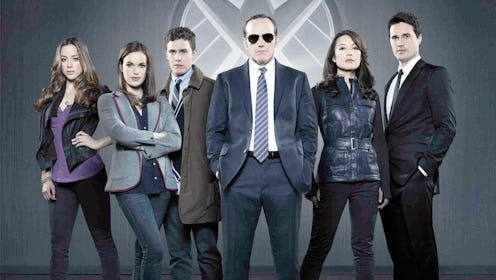Entertainment
Will 'S.H.I.E.L.D.' Improve Superhero Diversity?

Marvels' movies and televisions shows may frustrate comic fans — after all, they often differ from the original stories that they're based on. But on screen, Marvel characters are misrepresented in another way: They're not nearly as diverse as they are in the comics. A casual glance at the its characters in popular culture shows that nearly all of them have quite a few things in common: Marvels' superheroes are straight, white, and male. But this isn't due to a lack of diversity in the source material.
Abraham Riesman sums up the diversity of Marvel's comics pretty well in his article for Vulture:
In the past two years, Marvel readers have been treated to stories that push the boundaries of what superheroes can look like. The most visible examples of that trend have, not surprisingly, come in the franchise that has, historically, been Marvel’s cash cow: the X-Men books. The franchise's two flagship titles —All-New X-Men and Uncanny X-Men, both written by longtime comics scribe Brian Michael Bendis — have been exceptionally open-minded. At the center of both books is an explosive development: the introduction of a group of newly discovered mutants, the majority of them women or people of color. None are stereotypes, either — the Latino and black kids aren’t gangbangers who talk in slang, the female character isn’t whiny and vain, and so on; they’re just teenagers, figuring out their weird new situations. And speaking of female characters, the X-books these days practically make Girls look like a sausage fest. Indeed, in a cheeky bit of ironic titling, the series called X-Men was recently relaunched with an all-female cast of six X-characters — half of whom happen to be women of color. Nearly every issue of the main X-books passes the Bechdel Test, like, four times over. Oh, and there was that big same-sex wedding the X-Men had last year.
Riesman calls out the whitewashing of Marvel's characters, pointing out that only two of the superheroes in Marvel movies have been black, and only one of them has been a woman. And although there's a slew of Marvel superhero movies in the works, the chance that a woman will star in one of them anytime soon is not likely. Riesman chalks up this lack of diversity to the higher costs of venturing into movies and television, while also maintaining that it's a flimsy excuse for Hollywood.
But Riesman seriously underestimates Marvel's newest onscreen venture, Agents of S.H.I.E.L.D. He incorrectly names the main cast as 83 percent white, overlooking lead actress Chloe Bennet, who is half Chinese. And unlike most Marvel ventures, S.H.I.E.L.D has equal star power in its men and its women — its main cast is half male and half female. While many reviews champion Clark Gregg's performance as Phil Coulson, it's clearly Bennet's character, Skye, that the audience is meant to identify with.
And the appearances from actors of color aren't all bad — okay, the sexy Peruvian villainess was pretty terrible and pulled out some tired stereotypes. But while J. August Richards' superhero character, Mike Peterson, pulls some stunts that could be construed as racist (kidnapping, taking superhero-enhancing drugs), for a character who appears only in the first episode, he's incredibly well-rounded and clearly someone that viewers are supposed to sympathize with. He's given more background in the first episode than anyone in the main cast (besides Agent Coulson, who audiences already know). In fact, before the episode's events unfolded, I was looking forward to Mike Peterson appearing as a recurring character on the show. And of course, let's not forget Samuel L. Jackson's kickass cameo as Nick Fury.
Does this make the show the best example of Marvel's diversity? Definitely not. But the point is, the show is young, and already it's shown a lot of potential. And its television format gives it a big advantage over Marvel movies: The budget is smaller, the stakes are lower, and the possibility for new characters to appear is practically infinite. The very structure that Agents of S.H.I.E.L.D has set up demands that we be introduced to new characters each week; who's to say one of them couldn't be Falcon, or Wasp, or Echo, or Luke Cage?